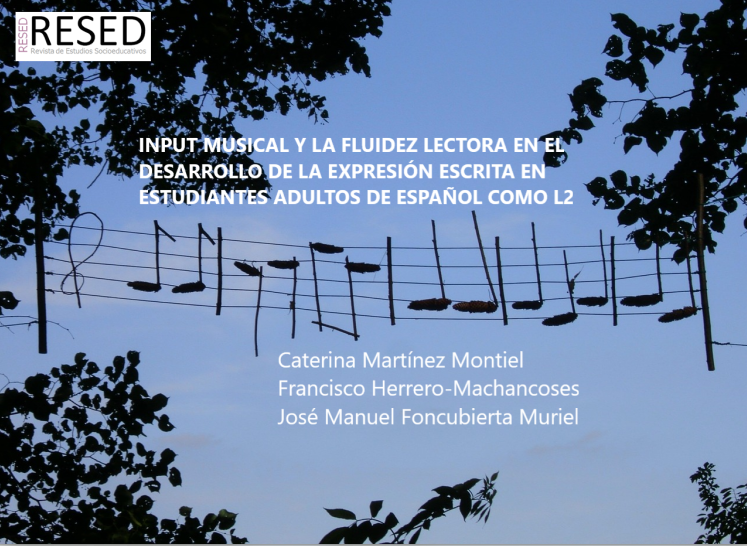Input musical y fluidez lectora en el desarrollo de la expresión escrita de estudiantes adultos de español como L2

Info
Résumé
La música comparte propiedades con el lenguaje. A lo largo de los años se ha estudiado el vínculo entre ambas y su impacto en el aprendizaje de una segunda lengua (en adelante, L2). En el presente artículo nos centramos en estudiar el desarrollo de la expresión escrita y su relación con dos variables: la fluidez lectora y el inputmusical. Este pequeño estudio experimental se sitúa en el marco de la investigación en acción. La muestra estuvo compuesta por un total de 13 estudiantes de español de nivel B1, que se dividieron en dos grupos: uno de ellos recibió estímulo musical y el otro no. Asimismo, a ambos grupos se les facilitó un test de expresión escrita, basado en una actividad de Mario Rinvolucri, y un test de fluidez lectora oral. El estudio correlacional indica que es posible que haya una influencia positiva en el uso de la música como input añadido al texto escrito.
Mots-clés
Téléchargements
Comment citer
Licence

Ce travail est disponible sous licence Creative Commons Attribution - Pas d’Utilisation Commerciale 4.0 International.
Références
Besson, M., Barbaroux, M., & Dittinger, E. (2017). Music in the brain: Music and language processing. In R. Ashley & R. Timmers (Eds.), Routledge Companion to Music Cognition. New York, NY: Routledge / Taylor & Francis.
Cunningham, A.E. & Stanovich, K. E. (1997): Early Reading Acquisition and Its Relation to Reading Experience and Ability 10 Years Later. Developmental Psychology, 33 (6), 934-945.
Failoni, J. W. (1993) Music as Means to Enhance Cultural Awareness and Literacy in the Foreign Language Classroom. Mid-Atlantic Journal of Foreign Language Pedagogy, 7, 97-108.
Foncubierta, J.M & Grant, M. (2016). “Awakening Senses for Language learning” en Fonseca-Mora, M.C. & Grant, M. (Ed.). Melodies, Rhythm and Cognition in Foreign Language Learning. Cambridge Scholars Publishing.
Gibson, C., Folley, B. S., & Park, S. (2009). Enhanced divergent thinking and creativity in musicians: A behavioral and near-infrared spectroscopy study. Brain and Cognition, 69, 162–169.
Gómez-Domínguez, M. (2016). Fluidez lectora oral en inglés como lengua extranjera. Tonos Digital, Revista de Estudios Filológicos, 31.
Gordon, R. L., Fehd, H. M., & McCandliss, B. D. (2015). Does Music Training Enhance Literacy Skills? A Meta-Analysis. Frontiers in Psychology, 6. https://doi.org/10.3389/fpsyg.2015.01777
Ho, Y., et al. (2003). Music training improves verbal but not visual memory: Cross- sectional and longitudinal explorations in children. Neuropsychology, 17(3), 439- 450.
Jiang, X., & Sengupta, A. K. (2011). Effect of music and induced metal load in word processing task. IEEE, 3261-3266
Huckabee, J. (2013). Improving Student Reading Fluency Scores through Music. A Capstone Submitted to the Gardner-Webb University School of Education in Partial Fulfillment of the Requirements for the Masters of Education.
Jensen, M. B. (1931). The influence of jazz and dirge music upon speed and accuracy of typing. Journal of Educational Psychology, 22(6), 458–462.
Kämpfe, J., Sedlmeier, P., & Renkewitz, F. (2011). The impact of background music on adult listeners: A meta-analysis. Psychology of Music, 39(4), 424–448.
Lems, Kristen (2001): Using Music in the Adult ESL Classroom. ERIC Digest.
Kariuki, P., & Honeycutt, C. (1998). An investigation of the effects of music on two emotionally disturbed students' writing motivations and writing skills. (ERIC Document Reproduction Service No. ED427491).
Kormos, J. (2012). The role of individual differences in L2 writing. Journal of Second Language Writing, 21, 390–403.
Krashen, Stephen (1984) “Writing: research, theory and aplications”. Laredo Publishing Co: California.
Krashen, Stephen (1985) “The input hypothesis: Issues and implications”. Laredo Publishing Co: California.
Latif, M. M. (2013). What do we mean by writing fluency and how can it be validly measured? Applied Linguistics, 34(1), 99-105.
Lems, K. (2003). Adult ESL oral reading fluency and silent reading comprehension. Unpublished doctoral dissertation. Evanston, IL: National College of Education.
Patel, A. D. (2008). Music, language, and the brain. New York: Oxford University Press, Inc.
Ransdell, S. E., & Gilroy, L. (2001). The effect of background music on word processed writing. Computer in Human Behavior, 17, 141-148.
Rauscher, F.H., Shaw, G.L., Ky,KN (1993). Music and spatial task performance. Nature, 365: 611
Romero Loaiza, F. (2004). Stephen D. Krashen: la lectura y su relación con la escritura. Repes: Revista Electrónica de Educación y Psicología, 1 (2).
Schellenberg, G. E., & Weiss, M. W. (2013). Music and cognitive abilities. In D. Deutsch (Ed.), The psychology of music (3rd ed.) (pp. 499 – 550). London: Elsevier.
Schellenberg, E. G. (2015). Music training and speech perception: a gene-environment interaction. Annals of the New York Academy of Sciences, 1337(1), 170–177. https://doi.org/10.1111/nyas.12627
Slevc, L. R., & Miyake, A. (2006). Individual Differences in Second-Language Proficiency. Psychological Science,17(8), 675–681. https://doi.org/10.1111/j.1467-9280.2006.01765.x
Slevc, L. R. (2012). Language and music: sound, structure, and meaning. Wiley Interdisciplinary Reviews: Cognitive Science, 3(4), 483–492. https://doi.org/10.1002/wcs.1186
Stanovich, K. (1986). Matthew Effects in Reading: Some Consequences of Individual Differences in the Acquisition of Literacy. Reading Research Quarterly, Vol. 21. (pp. 360-407)
Zeromskaite, I. (2014). The Potential Role of Music in Second Language Learning: A Review Article. Journal of European Psychology Students, 5(3), 78–88. https://doi.org/10.5334/jeps.ci

